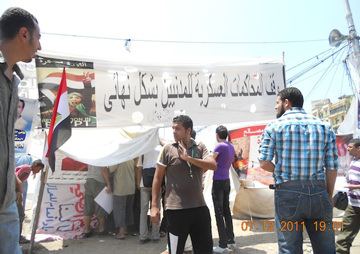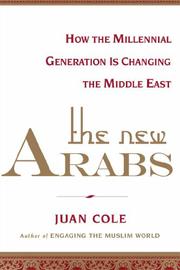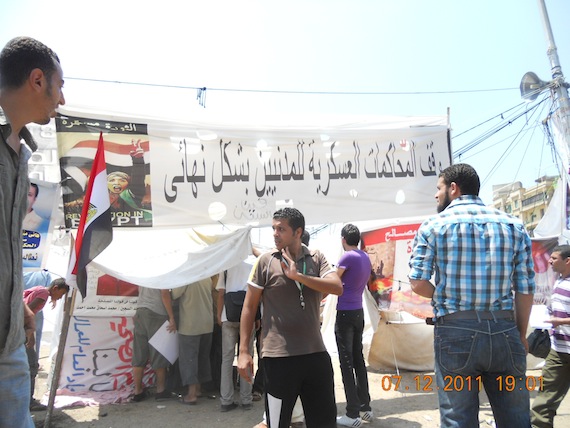Photo of the Day: Egyptian Youth Demanded End to Military Trials for Civilians
On the June 30 anniversary of the determined masses gathered in their millions at Tahrir Square and in city centers throughout Egypt, demanding a recall election for then Muslim Brotherhood President Mohamad Morsi, Tahrir Square in Cairo was blocked off and deserted.
This post originally ran on Juan Cole’s Web page.
Now:
On the June 30 anniversary of the determined masses gathered in their millions at Tahrir Square and in city centers throughout Egypt, demanding a recall election for then Muslim Brotherhood president Muhammad Morsi, Tahrir Square in Cairo was blocked off and deserted. Early on Monday, two bombs were detonated outside the Ittihadiya presidential palace, now inhabited by President Abdel Fattah al-Sisi, who made the coup against Morsi on July 3, 2013. Al-Sisi has taken power and imprisoned his predecessor and some 20,000 of his followers. But Egypt is subject to violence and, as today, to bombings. The political energy and enthusiasm of the youth last year this time has given way to sullenness and apathy, as al-Sisi turned on the revolutionary organizations with whom he originally promised to cooperate. Prominent novelist Ahdaf Sueif is speaking of a “war on the youth” of the country.
and then:
This photo is from my research archives, from July, 2011, five months after the overthrow of dictator Hosni Mubarak. It shows youth in Tahrir Square in Cairo demanding an end to military trials for civilians. It was brave of them to do so– publicly making the demand and putting up that sign could lead to their own arrest. The military tried thousands of civilians in 2011. I was in Tahrir Square researching my new book, just out in bookstores today, The New Arabs: How the Millennial Generation is Changing the Middle East
The grounds for military trials of civilians have been narrowed in the January 2014 constitution to instances where they are charged with harming the armed forces. But journalists are still subjected to such trials on national security grounds. Military trials of civilians are a serious human rights abuse.
The youth who died and sacrificed for the revolution did roll back the practice of military trials of civilians from the thousands of cases that were common in 2011. But they did not succeed in abolishing the practice altogether, as they wanted. And it is being used by the military today in ways that are unconstitutional by the text of the country’s 2014 organic law, passed by referendum in January.
Related book:
The New Arabs: How the Millennial Generation is Changing the Middle East

Independent journalism is under threat and overshadowed by heavily funded mainstream media.
You can help level the playing field. Become a member.
Your tax-deductible contribution keeps us digging beneath the headlines to give you thought-provoking, investigative reporting and analysis that unearths what's really happening- without compromise.
Give today to support our courageous, independent journalists.



You need to be a supporter to comment.
There are currently no responses to this article.
Be the first to respond.